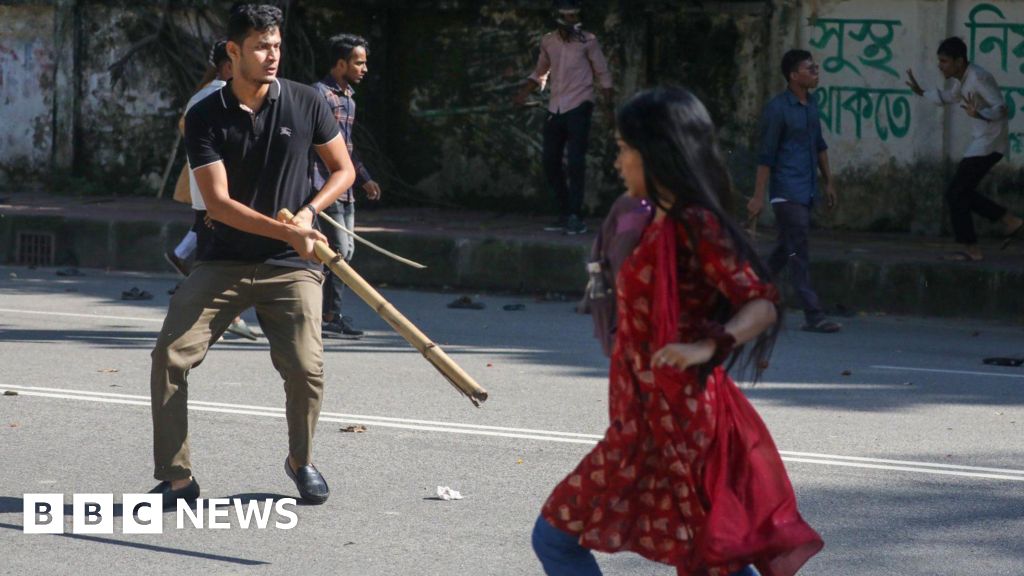Schools and universities across Bangladesh have been closed until further notice after six people were killed in protests against government job quotas.
College students have held rallies for days against a system of public sector job reservation for the children of war heroes who fought for the country’s independence from Pakistan in 1971.
Some jobs are also reserved for women, minorities and people with disabilities.
One-third of the posts are reserved for children of war heroes. Students believe the system is discriminatory and they want recruitment based on merit.
This week, several cities including the capital Dhaka witnessed clashes between supporters and opponents of the anti-quota movement, particularly between the student wing of the ruling Awami League Bangladesh Chhatra League (BCL). conflict.
Student groups attacked each other with bricks and sticks. Police fired tear gas and used rubber bullets to disperse clashing groups. Student activists said hundreds of people were injured in the attack.
“We blame the violence on BCL members. They killed protesters. Abdullah Salehin Ayoun, one of the coordinators of the anti-quota movement, told the BBC that police There was no intervention to save the average student.
Government jobs in Bangladesh are highly coveted as they pay well. In total, more than half of the jobs, totaling hundreds of thousands, are reserved for certain groups.
Critics say the system unfairly benefits children from pro-government groups that support Prime Minister Sheikh Hasina, who won her fourth consecutive election in January.
Ms Hasina’s government scrapped the reservation in 2018 following protests.
But a court ordered authorities to reinstate the quotas in early June, sparking the latest round of protests.
Three people were killed in the southern port city of Chittagong, two in Dhaka and a student was killed by a stray bullet in the northern city of Rangpur, officials said.
Media reports said at least three of the victims were students, but this has not been officially confirmed.
The government blames opposition groups for the violence.
“The opposition Jamaat-e-Islami and the Students’ Front of the Bangladesh Nationalist Party [BNP] has infiltrated this anti-quota movement. They are the ones who initiate violence,” Law Minister Anisul Huq told the BBC.
Bangladesh’s Supreme Court suspended the current system last week, but protests are expected to continue until it is permanently scrapped.
“The case has been scheduled for hearing on August 7. The students will have an opportunity to present their arguments in court,” Mr Hook said.
Police raided the Dhaka headquarters of the main opposition BNP party in a late-night operation on Tuesday after violent clashes.
Senior BNP leader Ruhul Kabir Rizvi said the raid was nothing but theater and a message to students to go home.
Protests have raged for days, with students blocking roads and highways in Dhaka and other major cities, paralyzing traffic.
Student leaders said they were outraged by recent comments by Ms Hasina, who they said described those who opposed job quotas as Razaka – This term is used to refer to those who collaborated with the Pakistan Army during the 1971 war.
Several student leaders said Ms Hasina linked them with Razaka. They said the comparison also encouraged BCL members to attack them.
“They want to silence our voices by creating a reign of terror in the country. If I don’t protest today, they will beat me another day. That’s why I took to the streets to protest,” said Dhaka University female student Rupaya Che Rupaiya Sherstha told the BBC.
But government ministers said Ms Hasina’s comments had been misinterpreted and she did not call students Razaka.
Mohammad Ali Arafat, Minister of State for Information and Broadcasting, denied accusations that the student wing of the Awami League had caused the violence.
He said the trouble started after anti-quota students terrorized residents of a hall in Dhaka.
“The government does not gain anything if there is chaos on university campuses. We want to maintain peace,” Mr Arafat told the BBC.
U.N. Secretary-General Antonio Guterres called on the government to “protect demonstrators from any form of threat or violence,” his spokesman Stephane Dujarric said.
Students vowed to continue protesting until their demands were met.
The government has stepped up security by deploying the paramilitary Bangladesh Border Guard force in five major cities, including Dhaka and Chittagong.

